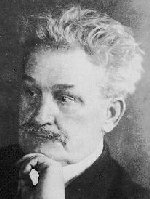

LEOS JANACEK
3rdJuly 1854 --- 12thAugust 1928
Copyright 1994-1998 Encyclopaedia Britannica
Last Updated on 2020
By Steven Ritchie
And now for the Music

New (3149)"Stringquartett No.2, Intimate Letters (1928)". Sequenced by Reinhold Behringer.
New (3150)"The Makropulos Case, Prelude". Sequenced by Andrew Silverman.
New (3151)"Mladi (Youth)". Sequenced by Andrew Silverman.
Thanks to Gary Goldberg for the music below. Email (GaryG@ix.netcom.com)
(2632)"The finale, The Death of Taras Bulba". Sequenced by Gary Goldberg
(1209)"Sinfonietta Opus.60 (1926)". Sequenced by Reinhold Behringer modified by Dr David Siu (1219)"Sinfonietta No.2 (The Castle)". Sequenced by Dr David Siu
(1210)"Sinfonietta No.3 (The Queen's Convent)". Sequenced by Dr David Siu (1211)" Sinfonietta No.4 [The Street]". Sequenced by Dr David Siu (1220)"Sinfonietta No.5 (The Town Hall)". Sequenced by Dr David Siu (77a)"Glagolitic Mass No.1 Intro". Sequencer unknown (78a)"Glagolitic Mass No.7 Organ solo". Sequencer unknown (79a)"Glagolitic Mass No.8 Intrade". Sequencer unknown

If you done any Classical pieces of say for example, Delius, mozart, and so on etc,
please email them to the classical music site with details to
"classical (@) ntlworld.com" written this way to stop spammers
just remove spaces and brackets for email address, thank you.

Visitors to this page --

Back to Classical Midi Main Menu click "HERE"